
11 minute read
Daringly Diverse
DARINGLY Diverse
by Melissa McGee Buehler photos courtesy Mid Continent Farms
Variety is the spice of life, and the norm at Mid Continent Farms.
In the middle of north central Kansas, where the sunflowers stand at attention to the midday sun, and the wheat blows in the light breeze, Agriculture is the lifeblood of small communities thriving there. When looking on a map of the United States, near the middle of the country is Washington, Kansas. Just north of the famous flint hills of Kansas, Mid Continent Farms has built a multigeneration family venture based on a diverse, yet practical cowherd, along with a mixed farming operation.
The Stewart family began farming and raising cattle in 1916, with W.C. Mueller, Gregg Stewart’s great-grandfather. Gregg is now a fifth-generation stockman and owner of Mid Continent Farms (MCF) in Washington County, Kansas. During World War II, Ray Stewart, (Gregg and Kent’s grandfather) kept a cowherd and sold mules to the U.S. Army. Their father, Conrad, was more interested in the cash grain business and feeding out cattle. Gregg remembers, “Dad always said Grandpa was an ‘ole mule skinner’, so Kent and I came by trading livestock naturally.” Cow-calf pairs were not part of the operation until 1980.
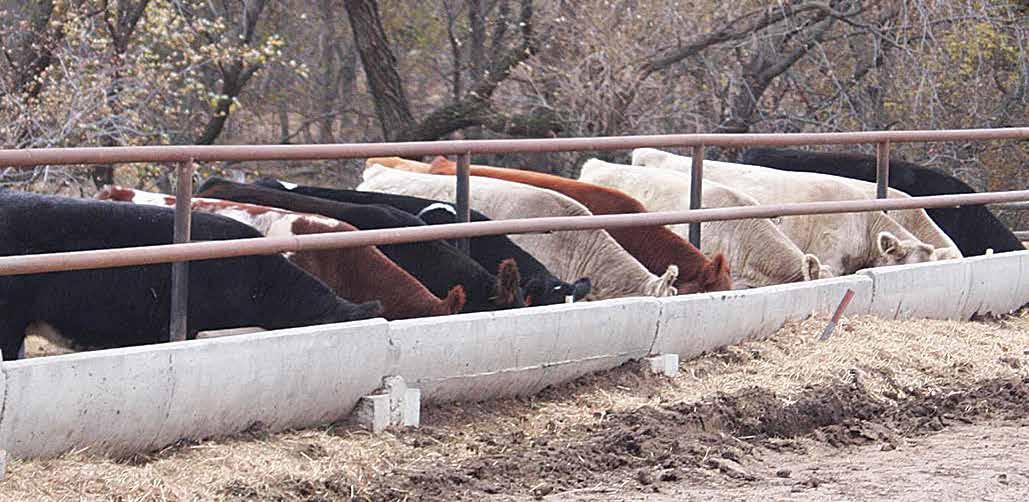
From its humble beginnings, the outfit has always been diverse in its business approach. Gregg has found letters to his great-grandpa, W.C. Mueller, that were dated by their yellow color and cursive handwriting. The letters came from farmers throughout Kansas and surrounding states inquiring about registered Polled Hereford bulls, Red Rock chickens, and local inquiries for eggs. Mueller sold a bull for $400, the same price as a new Model T Ford pickup at that time.
Today, MCF raises multiple breeds of seedstock, selling show steers and heifers along with bulls, replacement females and feeder steers. The operation includes Stewart’s immediate family, wife, Debbie and their three boys, Garrett, Brigham, and Tucker. Gregg and Brigham manage the cowherd and farming duties, while Debbie is the “CEO” of the operation. Debbie keeps all the guys in line, while also managing the office, accounting, cattle registrations, payroll, etc. Gregg’s parents, Conrad Stewart and Deanna Stewart Balthezor serve in supporting roles for the operation. Deanna cooks for the crew most days for lunch along her husband Keith. Conrad isn’t as active in the physical labor, but still acts in an advisory role from time to time. Gregg’s brother, Kent, is a partner in the operation, but runs his own herd of cows in Texas, and assists in the marketing of MCF cattle in the south.
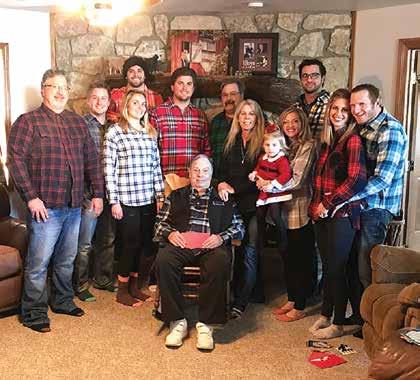
The Stewart family with Grandpa Conrad
The MCF crew also includes some talented full and part time help that have a diverse set of skills. Brigham says, “the guys that work for us have to know how to clip cattle, run heavy equipment, cowboy, and be a little bit handy. Throughout out the year, they do whatever we ask of them, whether it be sale preparation on show steers and heifers, calving cows, or harvesting crops, they are all up for any task.” Many of the employees at MCF started out as seasonal labor for the sale and wanted to stay full time so Stewarts gave them that opportunity.
Gregg gives the credit for starting the business to 4-H and FFA. He joined the Farmington 4-H Club when he was seven years old, and because of his brother, he has shown cattle since he was old enough to remember doing so. Gregg also participated in woodworking, cooking, horse, and market sheep projects. His mother, Deanna, was a 4-H leader for several years, guiding Gregg and Kent to do their best in each project. Deanna hauled the boys to the steer shows as well.
“The diversity of the cowherd allows us to sell more cattle.” - Brigham Stewart, Mid Continent Farms
The brothers enjoyed their steer projects and saw their future in it. Being members of 4-H provided opportunities for the boys to start livestock judging, which led to FFA and collegiate judging. Both were on judging teams at Colby Community College (CCC) and Kansas State University (KSU). The Stewarts’ cattle business began to receive national recognition when they visited farms for livestock judging practices. Gregg and Kent would work out a deal with the producer while they were there to judge. At that time, they started signing contracts to artificially inseminate more than 1,000 cows a year for several different herds, and in return were given the first pick of those calves from each herd. They also bought bulls to clean-up cows for those breeders. At seventeen and nineteen years of age, the boys sought out sales and breeders around the country to begin purchasing cattle to build their cow herd. Conrad trusted their abilities and sense of responsibility, while letting them make their own mistakes.
The boys’ first major purchase was 40 head of bred Chianina heifers from the Mile High Ranch in Colorado, and 40 more cows locally. To this day, Stewarts still have MC Cowboy bloodlines, originating from the first 40 heifers. With the help of their parents and their experiences, the business grew quickly, and the Stewarts needed an official name for their ranch. Recalling a name first used by the Dennis Aherin, a friend on the livestock judging team at CCC, they chose “Mid Continent Chianina” because of their centralized location in the United States. Later, they changed the name to “Mid Continent Farms” (MCF) as their operation began expanding to different breeds and various parts of the country.
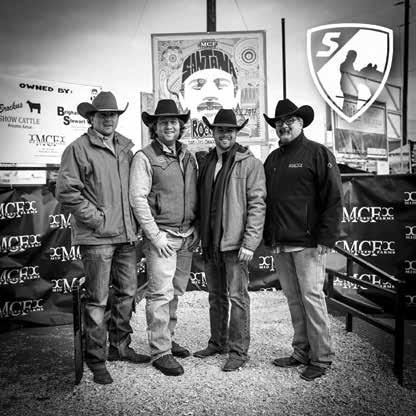
(l-r) Brigham Stewart, friend Wyatt Daines, Tucker Stewart, and Gregg Stewart.
Today the operation includes approximately 1,500 acres of tillable crop ground near Washington, Kansas, and two other ranch locations of grazing land in Kansas including the original pasture ground around Washington. With registered Maine-Anjou, Shorthorn, Charolais, Simmental, Angus, and Chianina, plus a handful of Herefords, MCF runs over 1,000 head of cattle representing various composites of the breeds. Although they are farmers and ranchers, Brigham said their focus in the last 40 years has been on the cattle, and they have always taken a practical approach to raising show steers and heifers.
To achieve functionality in the cowherd base, the Stewarts realized they needed to keep the basics in their herd and bought registered Angus cattle. “We decided to get involved in a big way to bring out the more functional traits of our crossbreds,” Gregg said. The operation started to breed their own Angus cattle when they found it hard to buy cattle that possessed the traits for which they were looking. “It wasn’t a conscious effort to become Angus producers,” Gregg shares. “Some show cattle herds don’t concentrate on the big picture. You can’t make practical advancements if you are only focused on phenotype.” Because of the diversity of the herd and the multiple ranch locations, it was becoming costly to keep the Angus herd separate on the Kansas ranch from a resource standpoint. Separating the Angus herd also spread out their marketing efforts and gave the herd its own identity. In 1995, Stewarts joined forces with the Ron Jones family of Benkelman, Nebraska, and created the Jones Stewart Angus Ranch. Jones bought half of the Stewart interest in the Angus herd and traded his show cattle to the Stewarts. For about 20 years, he handled the development side of the Angus business, because he had the facilities to handle the capacity of the herd. They also had a live auction bull sale in Benkelman while the herd was out there.
- Brigham Stewart, Mid Continent Farms
About six years ago, the Angus were moved back to Washington. To make them fit, some of the multi-breed cows was downsized to bring the Angus back to north central Kansas. The bulls are now developed in Washington, and yearling bulls are sold through an online bull sale in April, while they also sell bulls privately throughout the year.

MCF offers value added services that include help finding the right calf, clipping calves before a show, and advice on feeding. Photo courtesy Legacy Livestock Imaging.
Mid Continent bull customers range from large commercial producers to the guys with only 30 cows. The bull business relies on satisfied return customers that keep coming back year after year. Like the rest of the herd, the Angus cowherd is diverse, and they pay attention to calving ease, growth to weaning, and moderate yearling weights. Brigham states, “We breed cattle with power and dimension, longevity, fertility, maternal strengths, excellent skeleton, that are sound on the move. We still like to look at our cows. The cows work for us; we don’t work for our cows. They graze 10 or 11 months out of the year when the weather permits. Our cowherd is pretty young and fresh, because we strive to keep up with the trends in the Industry while staying very maternal. We are not going to jeopardize our cowherd by being too trendy, but we like to stay with the times.”
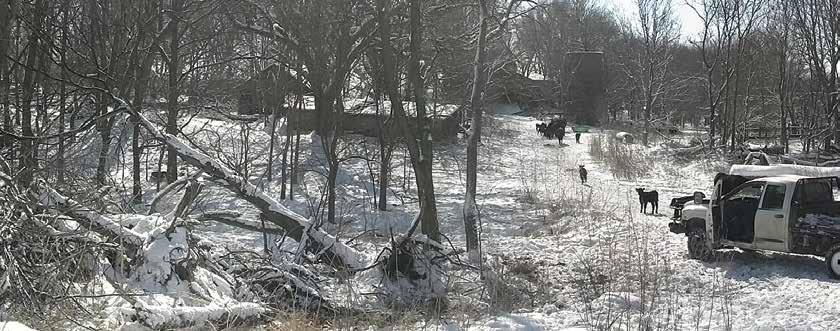
MCF Angus herd digging out following a blizzard.
The operation is extremely spread out, which allows for diverse grazing throughout the year. One ranch location is now two hours southwest, and another ranch 30 miles southeast of the ranch, with the remainder of the land right around Washington. With these three ranches, and varying rainfall in Kansas, Stewarts can rotate the cattle around, and use diversified cover crops and grazing techniques. Brigham states, “We have built our cowherd around our diversity. The diversity allows us to sell more cattle. The heifer sale is a seedstock sale with multiple breeds involved. The steer sale calves come from the same cow base that the heifers come from.”

MCF was one of the first operations to use live-bidding via the internet in their sales. LiveAuctions.tv offers live online bidding during the steer and heifer sale. This year’s steer sale was the 34th consecutive live auction, which makes the Stewarts one of the few producers to host that many consecutive steer auctions in the country. The steer sale was held October 12, 2019 and is always the weekend before the American Royal steer show in Kansas City. For many years, MCF only held a steer sale so that they could build the cowherd numbers. During that time, they would sell some of their elite show heifer prospects privately or placed them with families to show. Once the cowherd reached optimal numbers, the Stewarts began hosting their heifer sale in the fall, the Saturday after Thanksgiving. This November will be the 24th heifer sale. For many years, Stanley Stout auctioned the sales, and he was hard to replace after he passed away. Currently, Kevin Went cries the heifer sale, Dustin Glover sells the steers. Cattle have been sold to customers from California in the west to Maryland in the east and from Canada to Central America.
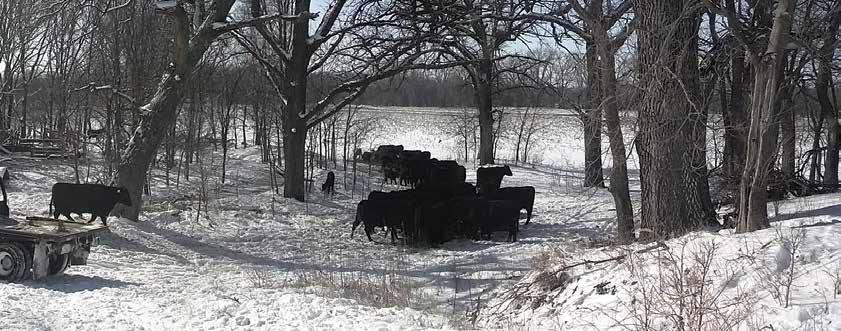
EYE ON THE FUTURE
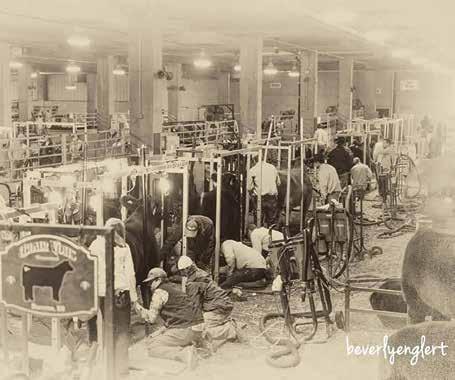
The next generation of Stewart boys are now an integral part of the operation. After all three boys attended Butler Community College and Kansas State University (KSU) for their undergraduate degrees, each son chose a different path. Garrett attended vet school at KSU and is now a partner in the vet clinic in Washington. He does all the vet work on the MCF herd. He also performs 90% of the Embryo Transfer (ET) work as well. Brigham came back to the ranch to manage the cowherd with Gregg. Tucker attended Washburn University Law School and currently works for the Kansas Livestock Association, where he lobbies for the interest of agriculture in Kansas, mainly livestock.
While at Butler, all three boys judged under Chris Mullinex, and then went on to KSU to judge under Scott Schaake. All the boys were on successful teams, but Brigham was fortunate to win the High Point Individual Judging Title at the National Contest in Louisville, Kentucky, and set a record in reasons scoring, on that still stands. All three boys were honored with collegiate All-American Awards. Being on the judging teams paid the boys’ way through college to get their undergraduate degrees. Brigham judges several state, regional, and national shows every year. He had the opportunity to judge at Calgary Stampede in July, 2019. His travels around the country have been a key factor in maketing MCF genetics since he returned home to the ranch.
Through growing up in the business and with the beef industry in their blood, the next generation of Stewarts knows the operation isn’t always sales, shows, and having fun. With the help of Gregg’s three sons, the ranch is using innovative new ideas to help the business continue to grow and evolve. The Stewarts also offer value-added services including helping clients find a show calf, helping clip before a show, and offering advice on feeding. “Customers may buy a calf,” Brigham reveals, “but they are also getting the service we can provide for them.” It is common to see some of the Stewarts at many shows around the country. “Even though we are working with clients and sales, we consider shows our vacation. We help with the show preparation for the cattle we sold or own a piece of and enjoy our time away from the farm,” Brigham says. The operation is gaining more national exposure by providing these services to their customers.
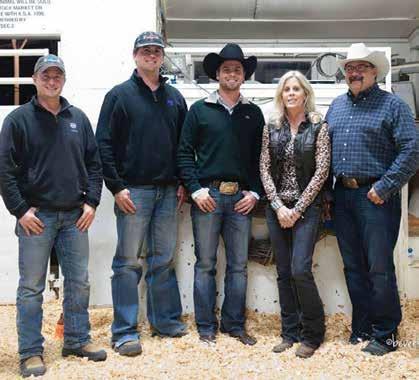
(l-r) Garrett, Brigham, Tucker, Deb, and Gregg Stewart. below the ranch in Lincoln, KS.
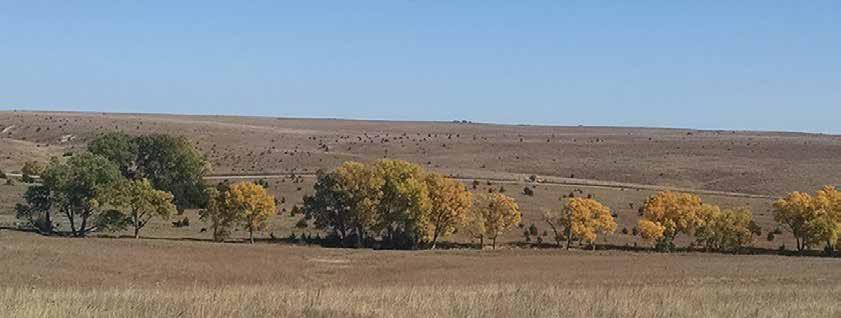
The ranch in Lincoln, KS.
The marketing efforts have paid off over the years. MCF has raised or owned several bulls that have gone on to make an impact on their herd and an others around the country. In recent years, JSAR Rodman and JSAR Titan have been heavily used for their look and maternal merit. Other Angus bulls like EXT, OCC Doctor, Gambles Hot Rod, Opportunity, and Journey make up an integral part of the cow base and can be found in many of the pedigrees today.
The consistency that is found in the cowherd has not been an accident. Brigham shared, “It took us quite a while to start flushing cows, because we needed them to be proven against their contemporary groups of about 100 head, to see if they were at the top end. A cow had to establish herself by producing several top-end natural calves by different matings to land in the donor pen.” After years of doing Embryo Transfer work, the Stewarts are more confident in flushing females with proven maternal lines earlier in production but like to evaluate the situation carefully before making that decision. “The bottom line of the operation is still based on the cattle that aren’t going to be show cattle.” Brigham stated, “When it’s all said and done, we sell 75% of our male progeny by the pound, so we want to produce maternal cattle without sacrificing carcass merit that will make money for both our operation and our customers.”
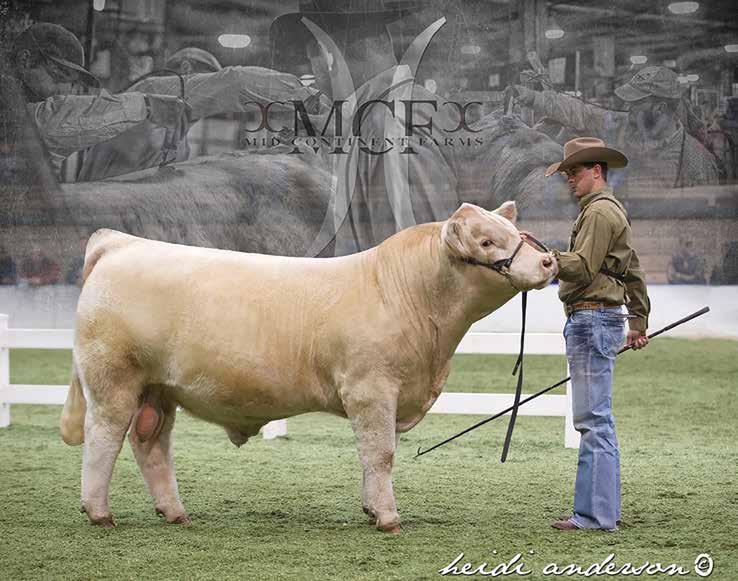
MCF Bohannon, National Champion Charolais Bull. Photo courtesy Legacy Livestock Imaging.



